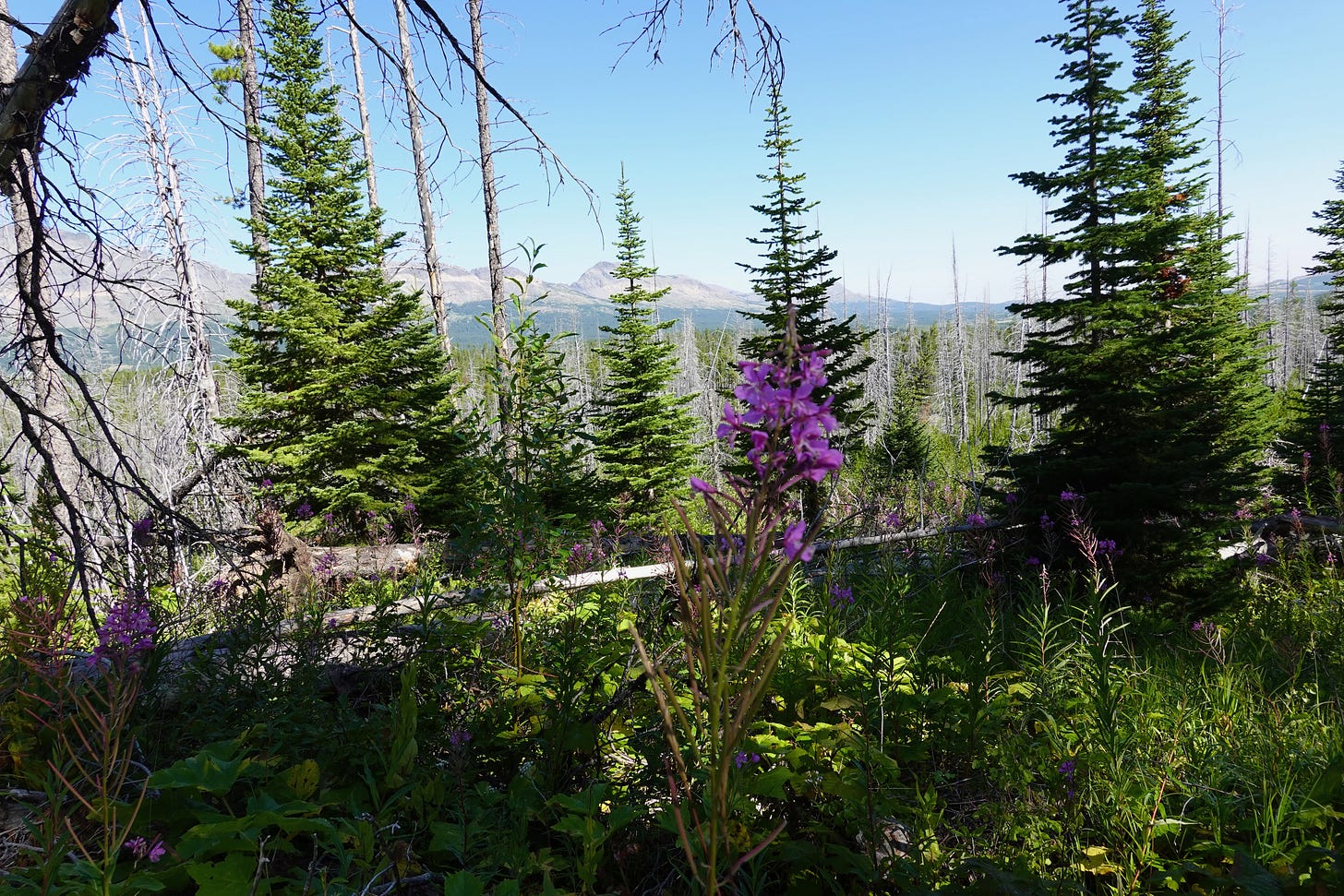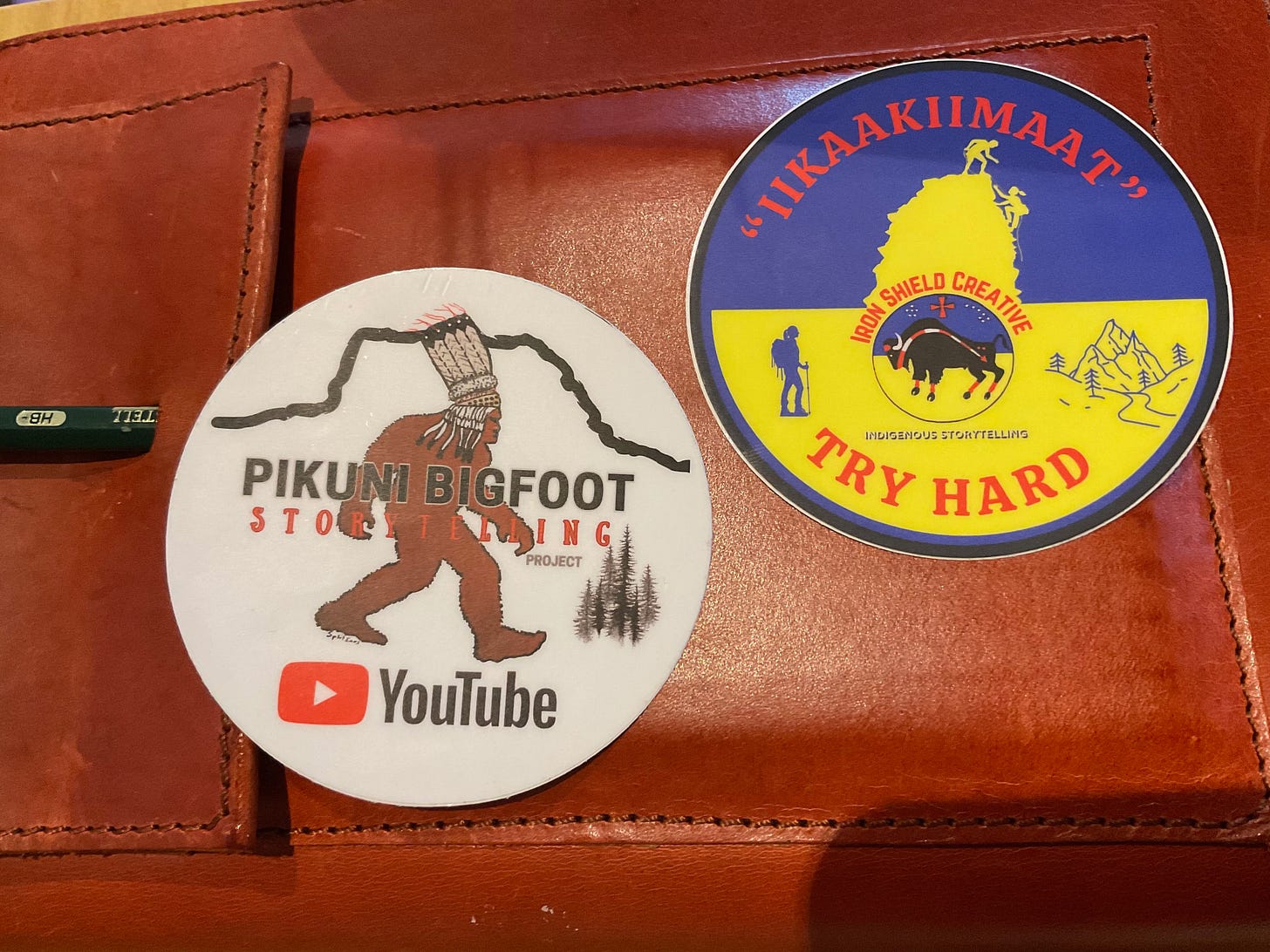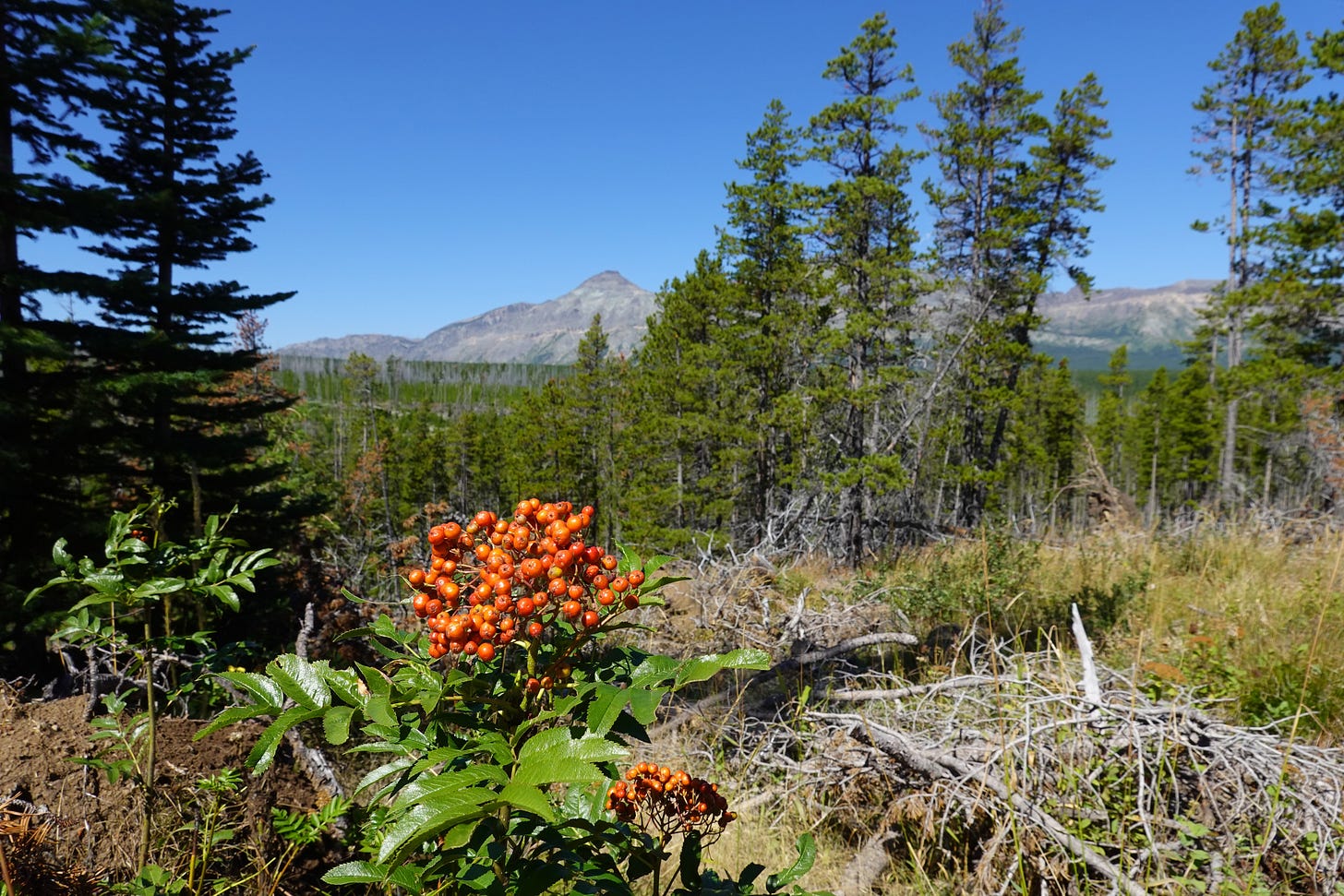Welcome! For those new here, On the Commons explores the ancient roots and ongoing consequences of private property and commodification—from the Doctrine of Discovery to ancient enclosures of the commons, and more—along with immersion in the offline, off-grid world, and examining the various systems that present barriers to simply being human. Paying subscribers will receive a free copy of A Walking Life until they’re gone.
New interview: Last Born in the Wilderness has been one of my favorite podcasts for years—it was the first place I heard Rune Hjarnø Rasmussen, Roy Scranton,
, Báyò Akómoláfé, and many more—and it was truly an honor to be invited for an extensive conversation with host Patrick Farnsworth. We talked maps, walking, land ownership, shame, and getting lost. When I saw Farnsworth’s title for this episode, “Taproots,” and the illustration he made to accompany it, I was thrilled and touched by how well they describe what I try to do in my work.Inner Life Collaborative republished a revised version of one of my favorite essays from a year ago, on serviceberries and abundance and the start of my personal year, when there is too much borscht in the fridge and it’s time to start making chokecherry jelly.
5% of this quarter’s On the Commons revenue will go to Ríos to Rivers. Next quarter’s 5% will go to Oglala Lakota Artspace (thank you to
for sharing some new-to-me organizations while compiling the GiveBackStack Directory, of Substack newsletters that donate all or part of paid subscriptions to charitable organizations.)
Audio version:
I recently got a ride home in a tow truck, whose driver extracted my car from its spot next to a lake where I’d met up with some old friends, who informed me after we parked that my car was both leaking something and smoking. (An oil leak, it later turned out. My 14-year-old Subaru has almost 200,000 miles on it and is at the life point where its problems are becoming more frequent and more expensive.)
While I wrestled with the realities of calling for a tow truck with a dumb phone that has no internet connection (why does everyone want to send an internet link to everything?) and trying to find an available family member to give me a ride home from where my friends were staying, we shivered in the water and talked about jobs, about work and the kinds of ethical compromises, to varying degrees, we all find ourselves making in our working lives. One of these friends and I had been raised, in a manner of speaking, by high school teachers who knew how to open and nurture intellectual curiosity, and a strong sense of a person’s obligation to the world and their community. It’s sometimes surreal to me how well those lessons have stuck with those of us lucky enough to have had those teachers.
I wasn’t going to ask the tow truck driver where in his job he felt his morals or ethics compromised, but did ask how long he’d been doing this job and if he got bored with it. “Sometimes,” he said, “but I listen to a lot of audio books,” which of course prompted me to ask what kind and we spent the rest of the drive exchanging our favorite science fiction writers and the merits of different narrators who can make or break an audio book.
My relationship with driving often tracks my relationship with my younger self, a teenager in this same small town I graduated high school in, playing the same loud guitar rock on the same local radio station, struggling with early versions of the adult battle between freedoms, desires, and responsibilities. I don’t know what people think when they see a 48-year-old mom driving downtown playing Poison way too loud in a car that is limping its way toward jalopy status, but I know that when I do it, it’s the only thing that gets me through that hour.
I wonder sometimes if I’d be better off in a job where I could drive around and listen to books or music all the time, except that too much driving makes me a little cranky and very sleepy. It reminds me that I seem to spend more of my time taking my car to and from the repair shop than to and from anywhere else. But for all my writing about walking, there’s still something about driving, buckling in and taking off somewhere, just me and my mind and whatever music I’m in the mood for. Especially early in the morning or at a dark enough hour that Moon is shining clear.
Summer is waning and with it my sleepy, winter-craving mood. The lakes are getting chilly again and the days shorter. I’m not excited about the rough rattle my car has developed—unrelated to the oil leak, or to the brake pads I had to replace earlier in the summer—but can’t help thinking of the journey it will take with me in late October to my favorite cabin, where ice might accompany my morning river dips and Sun will rise behind mountains already dusted with snow.
I enjoy our short summers as much as possible, but in truth I live for the winter months: the nose-nipping chill of the days, Sun’s sparkle on snow’s crust, and long, dark nights when I meet myself under the light of moonfall.
Readers who’ve been around a while will know of my love for an area of Montana, not too far from where I live, known as the Badger-Two Medicine. I’ve worked volunteer wilderness trail crew there a few times, and wrote about the region in the Introduction to the book I’m working on, No Trespassing.
Every single step I take in the Badger-Two Med is a tremendous privilege. I’m not even sure I could ever find the right words to describe the kind of gratitude I feel being there.
This was even more true on a recent hike there guided by Lailani Upham—the creative force behind Iron Shield Creative, and whose work I’ve been a quiet fangirl of for years—and Carrie Lynn Bear Chief, who both shared stories of the land and their own Blackfeet ancestry, and stories and songs from Chief Earl Old Person, recorded before he passed away in 2021. It’s impossible to describe what that moment was like. Protecting the Badger-Two Medicine from oil drilling was only one of his many lasting works; our guides spoke at length about his rare blend of powerful leadership with true humility.
I hadn’t expected the gift of such recordings, which they played in a shaded grove after we finished lunch. I wanted to sit there for the rest of the day, alone, listening to his voice echo among the trees.
I’ve been wanting to attend one of Upham’s cultural hikes for several years, and the journey was exactly that: a journey. Into a beloved land, history, story, and the meanings of leadership and wisdom. We walked and talked and ate huckleberries and thimbleberries and were prodded to call for Sasquatch (they run a YouTube channel dedicated to Sasquatch). It was more than a guided hike, more a journey into a reminder of what it feels like to be a living being on a living planet.
Since giving up my smartphone, I’ve been thinking a lot about disruption of systems, grit in the gears, what choices we can make that complicate our lives but free us from channelled behavior that we are rarely aware is dictated for us. Walking, I and others have written about, is by nature anti-capitalist. It’s inefficient. It’s life. It’s living. We’re meant to be, to attend, to relate, not just do and definitely not get done. It’s a way of restory-ing ourselves as human beings.
Storytelling came up a lot during the recent months I’ve been on a volunteer task force rewriting Montana’s K-12 English Language Arts educational standards. I said in more than one task force meeting—and wasn’t the only person expressing this truth—that storytelling is the heart of all learning.
As with how we move through our lives, learning shouldn’t be efficient. It shouldn’t be streamlined and standardized. It should be—and is; the true learning we do is this, whether we’re given academic credit for it or not—experiential and tactile and intergenerational and absolutely packed with stories.
I think there is something about storytelling and walking that are looped around each other, like DNA strands at the center of whatever it is that makes our species. They’re aspects of ourselves that the dominant culture wants all of us to forget, but they’re too much part of who we are. We know something about this truth even if we remain unaware of it.
Maybe that’s what I personally am learning each time I step into the Badger-Two Medicine. The ways in which storytelling and walking are related to each other, to our own humanity, and the ways in which we relate, or are relearning to relate, to the living world with which we breathe, grieve, laugh, repair, and wander. Maybe it’s the taproot I’m trying to follow, a way to unearth the beautiful heart of humanity’s true potential.
The day after my car’s oil leak was fixed, I was once again driving somewhere by myself and playing music way too loud—classic Offspring on a CD this time—and, glancing at the car next to me while sitting at a red stoplight, saw a guy in the driver’s seat of his Honda absolutely rocking out.
He paused when he saw someone watching him, and I paused, then there we both were, head banging for a minute in our own little worlds, happy dorks united until the light turned green. Like the tow truck driver’s and my shared enjoyment of science fiction, it was a reminder to me that cars, too, can bring us together in small ways.
I don’t know what his music was—Megadeath? the Clash? some modern band I’ve never heard of?—but I think Offspring’s “Gotta Get Away” fit the moment perfectly. (Which I would love to quote here but copyright rules regarding song lyrics are incredibly strict.)
A world away from the Badger-Two Medicine, from the wild worlds I love more than anything else, from rushing creeks and breeze-shushed trees, from the lands Sasquatch roams under ravens’ liquid calls. But it was part of all that, too, because it was, like all other life, connection. No matter what compromises we’re making, we still have every chance to be human together.
It. Was. Glorious.






I just love all of this so much--the headbanging in the car in parallel, I'm with you--I'm of the same generation and sometimes feel like I'm far more irreverent and ready to have fun than I ever have been. :) There is something about the ability to drive, to head off on one's own that I do love, as much as I also have many frustrations with car culture. Can't wait to listen to the podcast--taproots sounds exactly perfect for all that you write so beautifully of my friend.
Also the storytelling and walking--I love that, and it's so so true. Reminds me of Tyson Yunkaporta and David Abram writing about how Australian aboriginal culture stories the landscape--narrating the stories as they walk, woven into the landscape and memory. It's so something we sorely too often miss and need more of, in being in relationship with the lands we live on.
I love the audio of your posts! I always listen and read, in case I miss anything!
My Subaru will be 10 this year, and is behaving itself so far. I swear it prefers dirt roads in the Cascades to smooth pavement and has the scratches to prove it.
You had me thinking back to see if I could find a teacher or mentor "who knew how to open and nurture intellectual curiosity, and a strong sense of a person’s obligation to the world and their community." There was one professor in college. I guess that was enough!
Thank you for all of this.